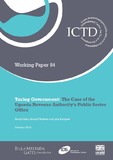| dc.contributor.author | Saka, Henry | |
| dc.contributor.author | Waiswa, Ronald | |
| dc.contributor.author | Kangave, Jalia | |
| dc.coverage.spatial | Uganda | en |
| dc.date.accessioned | 2018-10-19T09:08:48Z | |
| dc.date.available | 2018-10-19T09:08:48Z | |
| dc.date.issued | 2018-10-18 | |
| dc.identifier.citation | Saka, H.; Waiswa, R. and Kangave, J (2018) 'Taxing Government: The Case of the Uganda Revenue Authority’s Public Sector Office', ICTD Working Paper 84, Brighton: IDS | en |
| dc.identifier.isbn | 978-1-78118-490-5 | |
| dc.identifier.uri | https://opendocs.ids.ac.uk/opendocs/handle/20.500.12413/14092 | |
| dc.description.abstract | Virtually all the literature on taxation presents it as a relationship between government and non-government taxpayers. And even though in practice government organisations are – or should be – big taxpayers, very few revenue authorities treat these organisations as a separate segment of taxpayers. Different categories of taxpayers behave differently and so need to be treated differently to best encourage their compliance. With this in mind, in 2014, the Uganda Revenue Authority (URA) established the Public Sector Office (PSO) as a separate office to manage the affairs of government ministries, departments and agencies. Subsequently, the duties of the office were expanded to include the management of the affairs of politically influential individuals. Within the first year of its operation, the PSO had increased revenue collections from government organisations by 194 per cent when compared to the previous year. The PSO is now the second largest contributor to domestic tax collection in Uganda, after the Large Taxpayers’ Office. Its revenue share as a percentage of total domestic revenue collections grew from only 5 per cent in financial year 2014/15 to 17 per cent in 2016/17. In this paper, we examine the reasons behind establishing the public sector as a separate taxpayer segment. We also look into the factors that have enabled the success of this office. We find that the PSO’s successful performance is facilitated by a number of factors including having a proficient team of revenue officials; having the support of top URA management; collaboration and coordination with other key government offices; support from high-ranking government officials; and the use of ‘soft compliance’ strategies such as organising taxpayer workshops, making phone calls to relevant contact persons in government organisations and sending emails with reminders of due dates for filing tax returns and paying taxes. | en |
| dc.language.iso | en | en |
| dc.publisher | IDS | en |
| dc.relation.ispartofseries | ICTD Working Paper;84 | |
| dc.rights | Attribution-NonCommercial-NoDerivs 2.0 UK: England & Wales | en |
| dc.rights.uri | http://creativecommons.org/licenses/by-nc/4.0/ | en |
| dc.subject | Governance | en |
| dc.title | Taxing Government: The Case of the Uganda Revenue Authority’s Public Sector Office | en |
| dc.type | Series paper (non-IDS) | en |
| dc.rights.holder | © Institute of Development Studies, 2018 | en |
| dc.identifier.team | Governance | en |
| rioxxterms.funder | Default funder | en |
| rioxxterms.identifier.project | Default project | en |
| rioxxterms.version | NA | en |
| rioxxterms.funder.project | 9ce4e4dc-26e9-4d78-96e9-15e4dcac0642 | en |


